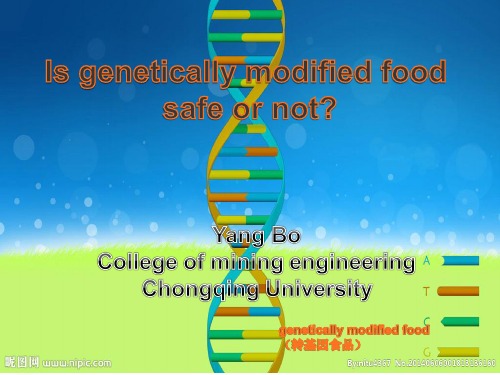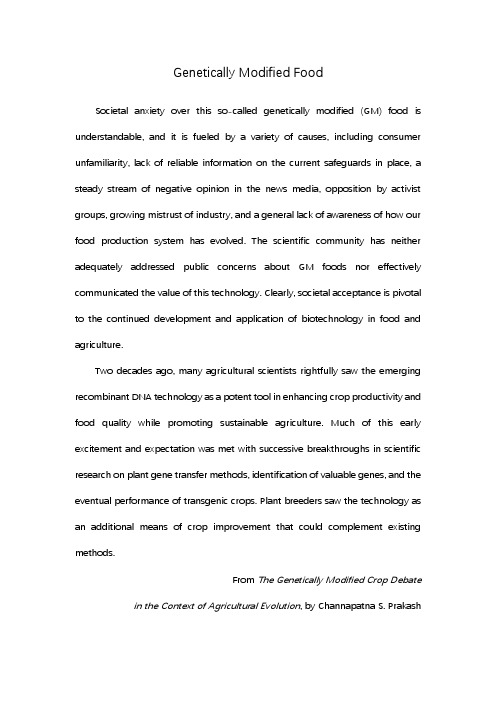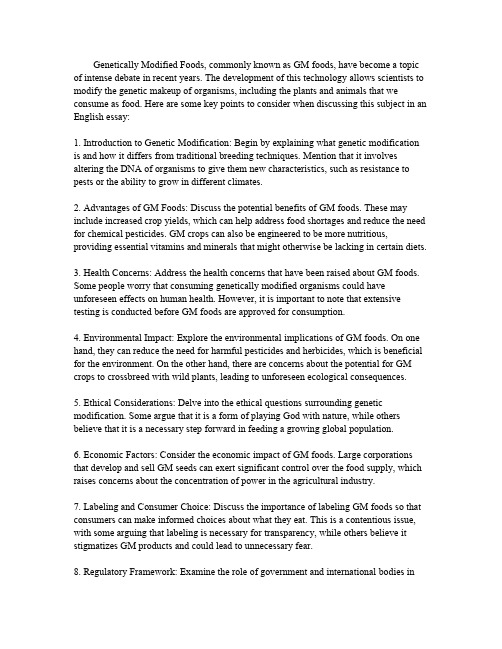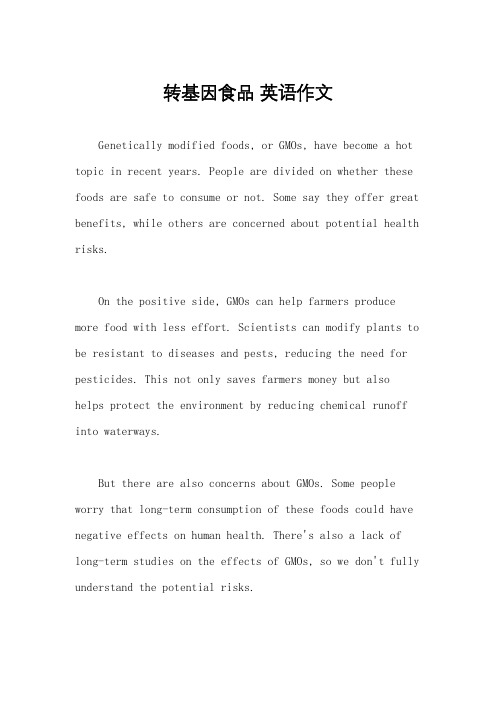Genetically Modified Foods and Its Safety Evaluation
Genetically modified food is safe or not

In American
1983
Genetically modified tomatoes was sold in the
supermarket
In American
1994
China 1997
2. The advantages of GMF.
A. To increase production(产量). B. Get rid of the influence from the season and climate(气候). C. Produce some food which is beneficial to health .
D. To reduce the production’s cost.
3.The disadvantages of GMF.
A. Maybe, It will affect human health. B. Destroy the ecological balance(生态平衡). C. Influence people's moral values(道德观).
Q1: Do you know genetically modified food (转基因食品)? Q2: Do you think genetically modified food is safe?
1. The history of the GMF. 2. The advantages of GMF. 3.The disadvantages of GMF. 4. GMF is sold in market. 5.Discussion
(大豆)
(玉米)
(油菜)
(棉花)
Made in China YES
基因食品的英文作文

基因食品的英文作文英文:Genetically modified foods, also known as GMOs, have been a controversial topic for quite some time. On one hand, they offer benefits such as increased crop yields and resistance to pests and diseases. On the other hand, there are concerns about the potential negative effects on human health and the environment.Personally, I am hesitant about consuming GMOs. While the benefits may seem appealing, I worry about the long-term health effects and the potential for unintended consequences. For example, a study found that rats fed adiet of genetically modified corn developed tumors andorgan damage. While this study has been criticized for its methodology, it still raises concerns about the safety of GMOs.Furthermore, I believe that consumers have the right toknow what they are eating and make informed decisions. Currently, many products containing GMOs are not labeled as such, making it difficult for consumers to make a choice. I think that labeling should be mandatory and transparent, so that consumers can make an informed decision about what they are putting into their bodies.中文:基因改造食品,也被称为GMO,一直以来都是一个有争议的话题。
翻译练习-Genetically Modified Food

Genetically Modified FoodSocietal anxiety over this so-called genetically modified (GM) food is understandable, and it is fueled by a variety of causes, including consumer unfamiliarity, lack of reliable information on the current safeguards in place, a steady stream of negative opinion in the news media, opposition by activist groups, growing mistrust of industry, and a general lack of awareness of how our food production system has evolved. The scientific community has neither adequately addressed public concerns about GM foods nor effectively communicated the value of this technology. Clearly, societal acceptance is pivotal to the continued development and application of biotechnology in food and agriculture.Two decades ago, many agricultural scientists rightfully saw the emerging recombinant DNA technology as a potent tool in enhancing crop productivity and food quality while promoting sustainable agriculture. Much of this early excitement and expectation was met with successive breakthroughs in scientific research on plant gene transfer methods, identification of valuable genes, and the eventual performance of transgenic crops. Plant breeders saw the technology as an additional means of crop improvement that could complement existing methods.From The Genetically Modified Crop Debate in the Context of Agricultural Evolution, by Channapatna S. Prakash转基因食品社会焦虑在这所谓的转基因(GM)食品是可以理解的,这是由于各种各样的原因,其中包括消费者不熟悉,缺乏可靠的信息对当前保障到位,源源不断的在新闻媒体负面意见,反对激进组织,行业越来越不信任,普遍缺乏对我们的食品生产体系是如何进化的。
转基因食品的作文英语翻译

转基因食品的作文英语翻译Genetically Modified Foods。
Genetically modified foods, also known as GM foods, are produced by altering the genetic makeup of an organism through genetic engineering techniques. This technology allows scientists to transfer genes from one organism to another, creating new varieties of crops that possess desirable traits such as resistance to pests and diseases, increased yield, and improved nutritional value.The use of genetically modified foods has been a controversial topic for many years. Supporters of GM foods argue that they offer a solution to the world's growing population and increasing demand for food, as well as the ability to reduce the use of harmful pesticides and herbicides. However, opponents of GM foods argue that they pose potential health risks and environmental dangers, as well as ethical concerns regarding the manipulation of nature.One of the main advantages of GM foods is their ability to increase crop yields and improve food security. With the world's population expected to reach 9.7 billion by 2050, it is crucial to find ways to produce more food with less land and resources. GM crops can be engineered to resist pests and diseases, reducing the need for harmful pesticides and herbicides that can damage the environment and human health. In addition, GM crops can be designed to grow in harsh environments, such as drought-prone regions, allowing farmers to produce food in areas where it was previously impossible.Another advantage of GM foods is their potential to improve nutritional value. Scientists can modify the genes of crops to increase the levels of essential vitamins and minerals, such as vitamin A and iron, which are often lacking in the diets of people in developing countries. This can help to reduce malnutrition and improve overall health.Despite these potential benefits, there are alsoconcerns about the safety of GM foods. Some studies have suggested that GM foods may pose health risks, such as allergic reactions and the development of antibiotic resistance. In addition, there are concerns about the potential environmental impacts of GM crops, such as the spread of genetically modified genes to wild plants and the disruption of ecosystems.In conclusion, the use of genetically modified foods is a controversial topic that continues to divide opinions. While there are potential benefits to the use of GM crops, such as increased crop yields and improved nutritional value, there are also concerns about their safety and environmental impact. As such, it is important for scientists, policymakers, and the public to carefully consider the risks and benefits of GM foods before making decisions about their use.。
转基因食物英语作文

Genetically Modified Foods,commonly known as GM foods,have become a topic of intense debate in recent years.The development of this technology allows scientists to modify the genetic makeup of organisms,including the plants and animals that we consume as food.Here are some key points to consider when discussing this subject in an English essay:1.Introduction to Genetic Modification:Begin by explaining what genetic modification is and how it differs from traditional breeding techniques.Mention that it involves altering the DNA of organisms to give them new characteristics,such as resistance to pests or the ability to grow in different climates.2.Advantages of GM Foods:Discuss the potential benefits of GM foods.These may include increased crop yields,which can help address food shortages and reduce the need for chemical pesticides.GM crops can also be engineered to be more nutritious, providing essential vitamins and minerals that might otherwise be lacking in certain diets.3.Health Concerns:Address the health concerns that have been raised about GM foods. Some people worry that consuming genetically modified organisms could have unforeseen effects on human health.However,it is important to note that extensive testing is conducted before GM foods are approved for consumption.4.Environmental Impact:Explore the environmental implications of GM foods.On one hand,they can reduce the need for harmful pesticides and herbicides,which is beneficial for the environment.On the other hand,there are concerns about the potential for GM crops to crossbreed with wild plants,leading to unforeseen ecological consequences.5.Ethical Considerations:Delve into the ethical questions surrounding genetic modification.Some argue that it is a form of playing God with nature,while others believe that it is a necessary step forward in feeding a growing global population.6.Economic Factors:Consider the economic impact of GM rge corporations that develop and sell GM seeds can exert significant control over the food supply,which raises concerns about the concentration of power in the agricultural industry.beling and Consumer Choice:Discuss the importance of labeling GM foods so that consumers can make informed choices about what they eat.This is a contentious issue, with some arguing that labeling is necessary for transparency,while others believe it stigmatizes GM products and could lead to unnecessary fear.8.Regulatory Framework:Examine the role of government and international bodies inregulating GM foods.Its important to have a robust framework to ensure safety and ethical considerations are taken into account.9.Future Prospects:Conclude by considering the future of GM foods.With advances in technology,its likely that genetic modification will play an increasingly important role in food production.However,its crucial to balance innovation with caution to ensure the safety and sustainability of our food supply.10.Personal Reflection:End your essay with a personal reflection on the topic.What are your thoughts on the use of GM foods?Do you believe the benefits outweigh the potential risks,or vice versa?Remember to structure your essay with a clear introduction,body paragraphs that explore each point in detail,and a conclusion that summarizes your main e evidence and examples to support your points,and consider presenting both sides of the argument to show a balanced view.。
转基因食品 英语作文

转基因食品英语作文Genetically modified foods, or GMOs, have become a hot topic in recent years. People are divided on whether these foods are safe to consume or not. Some say they offer great benefits, while others are concerned about potential health risks.On the positive side, GMOs can help farmers produce more food with less effort. Scientists can modify plants to be resistant to diseases and pests, reducing the need for pesticides. This not only saves farmers money but also helps protect the environment by reducing chemical runoff into waterways.But there are also concerns about GMOs. Some people worry that long-term consumption of these foods could have negative effects on human health. There's also a lack of long-term studies on the effects of GMOs, so we don't fully understand the potential risks.Another issue is that GMOs can affect biodiversity. When modified crops are planted, they can cross-pollinate with other plants, potentially altering the genetic makeup of entire ecosystems. This could have unexpected consequences for the environment and other species.Personally, I think it's important to be informed about GMOs and make our own decisions about what we eat. We should demand that companies label their products if they contain GMOs, so we can make informed choices. And we should support research into the long-term effects of these foods, so we can have a better understanding of the risks and benefits.In conclusion, GMOs are a complex topic with many different opinions. While they offer some potential benefits, there are also concerns about their safety and impact on the environment. It's important to stay informed and make our own decisions about what we eat.。
转基因食品英语作文
转基因食品英语作文Genetically Modified Foods。
Genetically modified foods, also known as genetically engineered foods or biotech foods, refer to foods that have been modified through genetic engineering techniques. The genetic material of these foods has been altered in a way that does not occur naturally through mating or natural recombination. The objective of genetically modifying foods is to improve their nutritional value, increase their resistance to pests and diseases, and enhance their shelf life.The debate over genetically modified foods has been ongoing for many years. Supporters argue that genetically modified foods can help to address the world's foodsecurity challenges by increasing crop yields and reducing the use of pesticides and herbicides. They also argue that genetically modified foods are safe for human consumption and have undergone extensive testing and regulation.However, opponents of genetically modified foods argue that they pose potential health risks, including allergic reactions and the development of antibiotic resistance. They also argue that genetically modified foods can have negative environmental impacts, including the development of superweeds and the loss of biodiversity.Despite the controversy surrounding genetically modified foods, they have become increasingly prevalent in the global food supply. Many countries, including the United States, China, and Brazil, have approved the commercial cultivation of genetically modified crops. In addition, many processed foods contain genetically modified ingredients, such as corn, soybeans, and canola.In conclusion, the debate over genetically modified foods is complex and ongoing. While supporters argue that they can help to address the world's food security challenges, opponents argue that they pose potential health and environmental risks. As consumers, it is important to educate ourselves about the potential benefits and risks ofgenetically modified foods and make informed decisions about what we choose to eat.。
转基因食品安全英语作文
转基因食品安全英语作文Genetically Modified Food SafetyThe topic of genetically modified (GM) foods has been a subject of intense debate and controversy in recent years. As the world's population continues to grow, the demand for food production has increased, leading to the development of new agricultural technologies, including the genetic modification of crops. While proponents of GM foods argue that they offer numerous benefits, such as increased crop yields, enhanced nutritional value, and resistance to pests and diseases, opponents raise concerns about the potential health and environmental risks associated with these foods.One of the primary concerns surrounding GM foods is their potential impact on human health. Critics argue that the long-term effects of consuming genetically modified organisms (GMOs) are not fully understood, and that there may be unanticipated consequences. They point to studies that have suggested potential links between GM foods and various health issues, such as allergic reactions, digestive problems, and even the development of certain types of cancer. However, proponents of GM foods counter that extensive safety testing is conducted on these products before they areapproved for human consumption, and that the scientific evidence does not support these claims.Another major concern is the potential environmental impact of GM crops. Opponents argue that the use of GM crops can lead to the development of herbicide-resistant weeds and the loss of biodiversity, as the introduction of genetically modified organisms can disrupt the natural ecosystem. They also raise concerns about the potential for GM crops to cross-pollinate with non-GM crops, leading to the unintended spread of genetically modified traits. Proponents of GM foods, on the other hand, argue that these crops can actually help to reduce the use of harmful pesticides and herbicides, and that they can contribute to more sustainable and environmentally-friendly agricultural practices.Another significant concern is the issue of labeling and consumer choice. Many consumers believe that they have a right to know whether the food they are purchasing contains genetically modified ingredients, and they argue that all GM foods should be clearly labeled as such. Proponents of GM foods, however, contend that current labeling requirements are adequate and that mandatory labeling would be costly and unnecessary, as there is no scientific evidence that GM foods are inherently unsafe.Despite these ongoing debates, it is clear that the use of GM foodswill continue to be a significant part of the global food system. As the world's population grows and the demand for food increases, the development of new agricultural technologies, including genetic modification, will likely play an increasingly important role in ensuring food security and sustainability.In conclusion, the debate over the safety of GM foods is a complex and multifaceted issue that involves a range of scientific, environmental, and ethical considerations. While both proponents and opponents of GM foods make compelling arguments, it is important for consumers to stay informed and to make their own informed decisions about the foods they choose to consume. Ultimately, the safety and sustainability of the global food system will depend on the continued research, regulation, and public dialogue surrounding this important issue.。
转基因食物 英语作文
转基因食物英语作文Genetically Modified Foods。
Genetically modified foods, or GMOs, are foods that have been altered in some way through genetic engineering. This process involves taking genes from one organism and inserting them into another in order to give it certain desirable traits, such as resistance to pests or a longer shelf life.While GMOs have been around for several decades, they have become increasingly controversial in recent years. Some people argue that they offer many benefits, such as increased crop yields and reduced pesticide use. Others, however, are concerned about the potential risks to human health and the environment.One of the main concerns about GMOs is that they may have unintended consequences. For example, there is some evidence that they may cause allergic reactions in somepeople. Additionally, some studies have suggested that they may harm beneficial insects, such as bees, which arecrucial for pollination.Another concern is that GMOs may have negative effects on the environment. For example, they may lead to the development of superweeds or superbugs that are resistant to pesticides. This can lead to increased pesticide use, which can harm both the environment and human health.Despite these concerns, many people still support the use of GMOs. They argue that they offer many benefits, such as increased crop yields and reduced pesticide use. Additionally, they argue that the risks of GMOs are relatively low and that they are rigorously tested before being approved for use.In conclusion, genetically modified foods are a controversial topic that has divided many people. While some argue that they offer many benefits, others are concerned about the potential risks to human health and theenvironment. Ultimately, it is up to each individual to decide whether or not they want to consume GMOs.。
是否该鼓励转基因食品英语作文
是否该鼓励转基因食品英语作文Should Genetically Modified Foods Be Encouraged?Genetically modified foods, or GMOs (Genetically Modified Organisms), have been a topic of debate and controversy for many years. While some argue that GMOs have the potential to solve global food shortages and improve nutritional value, others express concerns about their safety and long-term effects on human health and the environment. In this article, we will explore the reasons why genetically modified foods should be encouraged.First and foremost, GMOs offer a solution to the pressing issue of global food security. With an ever-growing population, the demand for food is increasing at an unprecedented rate. Traditional agricultural practices alone may not be sufficient to meet this demand. Genetically modified crops, on the other hand, have the potential to produce higher yields and withstand harsh environmental conditions, such as drought or pests. By encouraging the cultivation of GMOs, we can ensure a stable and sufficient food supply for future generations.Furthermore, genetically modified foods have the potential to improve nutritional value and address malnutrition. Scientists have successfully developed crops that are fortified with essential vitamins and minerals, such as golden rice, which is genetically modified to contain increased levels of vitamin A. This innovation could have a significant impact on regions where vitamin A deficiency is prevalent, reducing the risk of blindness and other health issues. By promoting the consumption of genetically modified foods, we can contribute to the overall improvement of public health.Another advantage of GMOs is their potential to reduce the use of harmful pesticides and herbicides. Traditional farming methods often rely on the excessive application of these chemicals, which can have detrimental effects on the environment and human health. Genetically modified crops, however, are engineered to be resistant to pests and diseases, reducing the need for chemical interventions. This not only reduces the environmental impact but also minimizes the exposure of farmers and consumers toharmful substances. Encouraging the adoption of GMOs can therefore contribute to sustainable and eco-friendly agricultural practices.Critics of genetically modified foods often raise concerns about their safety. However, extensive research and scientific studies have consistently shown that GMOs are as safe for consumption as their non-modified counterparts. Regulatory bodies, such as the World Health Organization and the Food and Agriculture Organization, have conducted thorough assessments and concluded that genetically modified foods currently on the market are safe for human consumption. It is important to base our opinions on scientific evidence rather than unfounded fears.In conclusion, the benefits of genetically modified foods outweigh the concerns raised by their critics. By encouraging the cultivation and consumption of GMOs, we can address global food shortages, improve nutritional value, reduce the use of harmful chemicals, and contribute to sustainable agriculture. It is essential to embrace scientific advancements and make informed decisions based on rigorous research. Genetically modified foods have the potential to revolutionize our food systems and pave the way for a more sustainable and food-secure future.。
